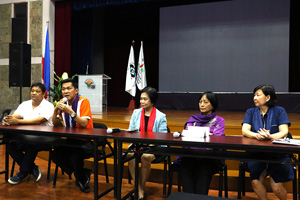
Farmers, entrepreneurs, and experts discussed over the potentials of sweetpotato in a forum held on July 9, 2019 at the Sweetpotato Farms and Industry Encounters through the S&T Agenda (FIESTA) at the Bureau of Soils and Water Management (BSWM), Quezon City.
Titled, “Technology Investment Policy Forum: Farmer-Industry Encounters,” the activity discussed the strengths, opportunities, and challenges of producing, processing, and marketing sweetpotato.
Leading the panel discussion were: Pampanga rootcrop farmer Richard Torno; Visayas State University (VSU) President Edgardo Tulin; Department of Agriculture (DA) Undersecretary for High Value Crops and Rural Credit Evelyn Laviña; Food and Nutrition Research Institute of the Department of Science and Technology (DOST-FNRI) Research Specialist Rosario Sagum; and International Rice Research Institute (IRRI) Social Scientist Thelma Paris.
Dr. Torno imparted his experiences and difficulties of his fellow farmers in harvesting sweetpotato because of lack of knowledge and resources.
Aside from the hardship involved in farming sweetpotato, he said that determination will help every farmer to be better at the trade even with mistakes being committed along the way.
Meanwhile, Dr. Tulin shows his full support for the development of the sweetpotato industry especially because of its several potentials.
Dr. Tulin shared to the audience his first work that involved producing wine from weevil-infested sweetpotato. Despite its infection, he said that the damaged sweetpotato was still useful for consumption.
On the other hand, Usec. Lavina discussed the importance of having a simpler and understandable roadmap for developing sweetpotato.
“It has to be understood by everyone on the ground, especially the farmers. They are the ones who will directly benefit from this roadmap,” she explained.
She also stressed the importance of strengthening organizations and capacitating farmers to provide a more sustainable impact in the industry.
Dr. Sagum focused on the nutritional aspect of sweetpotato, saying that its fiber content can raise one’s very-low-density lipoprotein or good cholesterol. She also cited a project where a rice-like food made of sweetpotato, flour, and corn can be used as emergency food during calamities.
Dr. Paris, in her 33 years of working at IRRI, acknowledged that rice technologies alone will not reduce poverty and improve nutrition in the country.
She then explained the importance of sweetpotato in rice-based systems as well as the increasing empowerment of women going into marketing and farming because of advanced technology.
The forum was capped with an open forum from various sectors such as farmers, entrepreneurs, and researchers.
The challenges brought up include ensuring the sustainability of the programs promoting sweetpotato and financial limitations in acquiring sweetpotato-based technologies.
The forum is part of the Sweetpotato FIESTA, which aims to promote sweetpotato as a nutritious superfood and as a promising food industry.
The FIESTA is an initiative of the Philippine Council for Agriculture, Aquatic and Natural Resources Research and Development of the DOST (DOST-PCAARRD) in promoting research-based technologies to its intended stakeholders.
